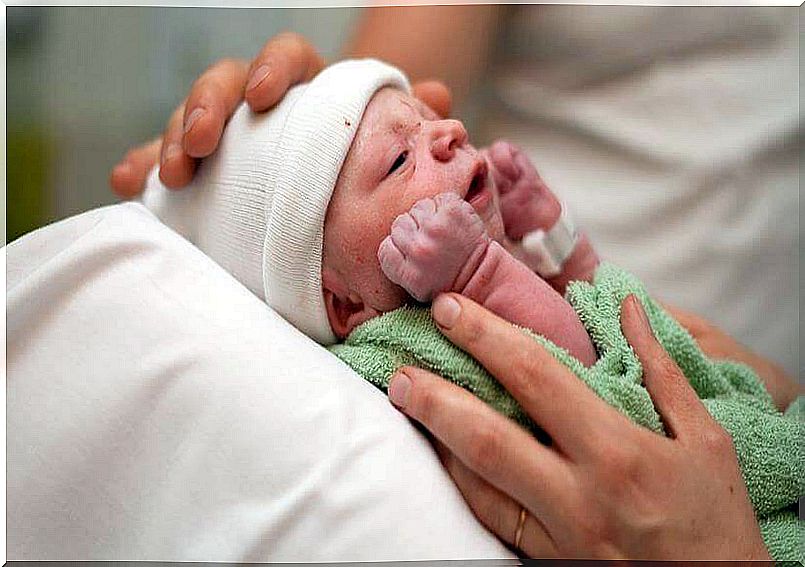Baby Care: 8 Things To Avoid

Have you just become a mother? Do you already know how to take care of your newborn ? We know that for the baby, the touch, the smell and the mother’s voice are sources of great calm. And the mother too, for her part, feels beautiful and intense sensations. However, motherhood can also lead to doubts and a certain nervousness, especially when it comes to the first birth.
Among the advice of grandmothers, sisters, aunts and friends who are already mothers, the prenatal course and all the information read on the internet, it is likely that the new mother will end up being confused by the amount of advice.
The ideal is to live the experience of motherhood starting from the right premises. In this article, we share with you eight situations to avoid in baby care .
Baby care: what to avoid
1. Ignore it

Never leave the baby alone, in the bedroom, in the crib, on the changing table or in another room. A newborn cannot be left alone, nor can it be ignored, not even for a moment.
There is a belief that “you need to learn to be independent”, but it will take time for that. This process occurs naturally and gradually during the first year of life and it is not necessary to force it.
Like all mammals, the newborn relies on the mother’s care. After spending 9 months in the womb, where he could only hear her voice, he will cry for having her next to him.
Crying is his way of communicating. If he cries it’s because he needs something: he’s hungry, he’s got a dirty diaper, something hurts him or he just wants his mother. Pay attention to crying, and if you can install baby monitors to keep the situation under control if the baby is in another room.
2. Breastfeed at predefined times
If you have chosen breastfeeding, although it is challenging, you will discover there is nothing more beautiful than the moment when the baby feeds from your breast, while staring into your eyes.
In fact, breastfeeding does not have to follow a schedule, but to take place on demand. Feeding every three hours refers to babies who are breastfed with powdered milk.
The World Health Organization (WHO) says that babies get full easily due to the small size of their stomach. For this reason they need to eat frequently, even at hourly intervals. This also helps to increase milk production.
A newborn baby not only needs the mother’s breast when he is hungry or thirsty. But it is also the only way she has to bond, find comfort, and feel the love of her mother.
3. Let him cry

There will be no shortage of advice from grandmothers or aunts who will tell you to let him cry in the cradle, to prevent him from getting used to bad things; while the most daring will come to tell you that she is crying to manipulate you.
Manipulation is a concept that applies to adults, not to a newborn. He may be hungry, dirty, or hot or cold. He may also have difficulty breathing or feel some discomfort. A child cannot solve these problems on his own, he needs the help of the mother.
Crying is his only form of expression; when she cries, she wants to tell you something. A baby who cries and is not paid attention to will stop crying at some point because he receives the following message: We don’t care what is going on.
4. Things to avoid in baby care: leave him alone while he sleeps
The newborn does not sleep like an adult. He wakes up every two or three hours and looks for his mother to go back to sleep. A child is not taught to sleep: he will sleep because it is natural to do so.
Falling asleep on its own is a process that it will progressively achieve as it grows. If you are not convinced that sleeping together is feasible for both of you, at least make sure that the crib is next to your bed, so that you can take care of him more easily. This will allow you not to get up too many times during the night.
5. Shake it sharply

It can be infuriating to hear the baby cry continuously after sleepless nights. It is easy to fall into the temptation to shake him because he is assailed by impotence. But it is something very dangerous.
A sharp jolt will not stop the baby from crying. It is more likely to scare him or cause damage to his fragile little body.
In fact, in severe cases it could cause the well-known “Shaken Baby Syndrome”. This is why it is important to be very careful. Frequent and affectionate hugs will give him the peace and serenity he needs to calm down.
6. Deny your arms to him
The mother’s arms have a relaxing effect on the newborn. If she does not have the experience of regularly relaxing in her mother’s arms, she will hardly learn to let go later in life.
A newborn needs contact with his mother to support him, protect him and make him feel comfortable.
In fact, a study published in the Colombian journal Psicoanalisis points out that maternal love greatly affects the child’s cognitive and emotional development.
Therefore, in the absence of proper emotional education, it is likely that as an adult you develop emotional problems. In addition, hugs, along with breastfeeding, help strengthen the bond between mother and child and promote the production of happiness hormones.
On the other hand, several studies show that hugs help improve children’s self-esteem and promote psychological well-being. Therefore, do not hesitate to hold your baby as much as possible.
This does not mean that you have to do it all the time, as you will have other things to do. Show your affection when you get the chance.
7. Punish him

A spanking teaches the baby not to trust those who take care of them, to repress their needs , not to discover the world around them, not to have faith in themselves. This will get used to the pain and stress.
To raise children happy and sure that their needs will be met, you need to be patient. Caring for a newborn is a difficult thing! But children need parental patience.
Something Important: When parents are able to control their negative emotions, they help grow empathic and cooperative future adults.
In this sense, a study published in the journal Anales de Psicología is based on an experiment conducted with families, using modern and traditional educational methods.
Eventually, it was concluded that children from modern (attachment-based) families exhibited greater cognitive and linguistic development. This shows that punishment is not an effective way to educate children, because they will not understand such behavior, it will only cause stress and it is possible that it will slow down their intellectual growth.
8. Don’t trust your instincts
There are an infinite number of opinions, from those of specialists to those that have been told to you by the mothers you know. It’s okay to listen to the ideas of others, but be clear that you will decide later.
While this circle of mothers and women can be an important support in the beginning of your relationship with your child, when a little voice whispers to take another path, trust yourself.
How to take care of the newborn?
Motherhood is not something easy and there is no mathematical formula that works for everyone. No one was born already knowing how to be a good mother and it is okay to ask for the necessary help (from your mother, a friend, the pediatrician, etc.), as long as you are master of your decisions and do not get carried away.
The first months of life can be difficult and there are many things to take into consideration, like the ones we have anticipated in this article, but they will also bring you many beautiful experiences that you will remember throughout your life, in difficult times. Don’t forget it.









